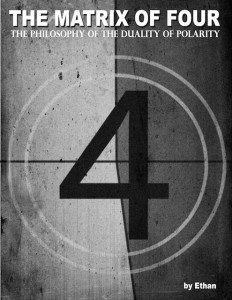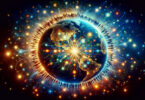Contributing Writer for Wake Up World
Is our universe eternal? Or not? Or both? Or neither? ~ The Fourteen Unanswered Questions of Buddha
The philosophy of The Duality of Polarity is a meta-philosophy that conceptualizes our individual and collective consciousness. It is based on the four aspects of reality, and provides a formula from which one can develop an understanding of the nuances of human behavior and experiences of all sorts. It is a revelatory meta-philosophical perspective, offering a clear window into the complexity of any situation.
[pro_ad_display_adzone id=”110028″]
Duality and Polarity
The physical, mental, spiritual and natural are the four aspects from which ‘the matrix of four’ concept sprouts. Frequently this set of four is mistaken for a set of three, such as with the triad of mind, body, spirit. This set omits the natural, the universal, the surroundings of which we are an intrinsic part.
Each of the four aspects of reality is based on and contain four aspects as well.
At a natural level, the Four Elements of fire, earth, air and water are ubiquitous.
For the physical aspect, matter (including our physical bodies) is composed of the four elementary qualities of extension, cohesion, caloricity (tejo), and vibration, while the basis of all physical life is the exchange of breath – see: The Matrix of Four Forms of Meditative Breath.
The mental elements are similarly divided into four groups: feelings or “receptions” (vedanÄ), ideas or “perceptions” (saà±à±Ä), what is variously translated as “mental activities” or “complexes” (saá¹…khÄra), and cognition or “conception” (vià±à±Äṇa). The mental aspect is also expressed through the basis of all mathematics, the four operations of arithmetic: addition, subtraction, multiplication and division.
And at a spiritual level, the Four Noble Truths as taught by Buddha are those of suffering, its cause, its cessation, and the way thereto.
The Polarity of Kindness
Everything is spiritual first. What we interpret on this physical plane originates in spiritual energy. The energy of our experience manifests in the physical body, to varying degrees. For instance, when we forget something, it is because spiritually, its karmic energy is not as weighty on our being as the things we do remember, or cannot forget. This is certainly true of my own experience with kindness.
Do you remember the last time that you went out of your way to practice kindness?
Do you remember the last time someone went out of their way be kind to you?
My guess is, most of you answered those two questions differently.
It is tremendously easy to forget the history of our own innate kindness, because those are moments where we lessen our karmic load – by lessening the load for others. In that moment, we connect to our purest spiritual capacity, and although we retain the energy of that exchange, conscious memory of these moments can easily become ‘lost in time’.
The best portion of a good man’s life: His little nameless, unremembered acts of kindness and love ~ William Wordsworth
On the other hand, when we are the recipients of random acts of kindness, we tend to remember them – distinctly – because they feel so good and, often, so starkly different than the other interactions we have in our inter-competitive society.
The Polarity of Un-Kindness
Do you remember the last time that you went out of your way to practice unkindness?
Do you remember the last time someone went out of their way to practice unkindness toward you?
On an energetic level, these moments hurt all involved. We do not forget these so easily… Unless the unkindness is so traumatic that we are shocked into a self-protective loss of memory. Generally speaking, it can be difficult to forget the unkindness in our lives, no matter how hard we try. The energetic scars can weigh heavily on our being, until we learn to understand, forgive and clear that energy.
Unkindness holds a different karmic weight or spiritual merit than kindness. Sometimes those who practice unkindness are literally caught up in an act, action after action, reaction after reaction, unconscious of the energetic wheel they are spinning on. Thus, it is possible to diffuse all sorts of confrontation with kindness and also possible to snap people out of their act – momentarily bringing them closer to their true nature.
Spiritually speaking, compassion and kindness diffuse karma instead of fusing it. And right now, humanity is going through a necessary process of evolving to become more compassionate.
The Wise Man on the Mountain
~ The following is my elaboration of a tale of Milarepa, the Buddhist Saint of Tibet and wise man on the mountain (and one of the origins of the ‘wise man on the mountain’ archetype)
Milarepa was meditating in a cave on top of a mountain. A thief passed by and saw that Milarepa had a golden bowl that one of his students had offered to him. The thief could not resist, for it seemed Milarepa was deeply absorbed in meditation and did not notice him.
The thief stealthily crept into the cave and as he went to grab the golden bowl, Milarepa smacked his hand and said “Is this what you want? This useless golden bowl? Here, have it! It is useless when dealing with karma!”
The thief was dumbfounded and begged Milarepa to teach him, promising only to seek kindness.
Random Acts of Kindness
Will you practice kindness? Or unkindness? Or neither? Or both?
The Matrix of Four
The Philosophy of the Duality of Polarity
From the Editor….
Wake Up World contributing writer Ethan Indigo Smith writes towards a peaceful world with a sharp and unique perspective, always following 1984 author George Orwell’s six rules for writing – mainly #6: “Break any of these rules sooner than say anything outright barbarous”.
Ethan proudly dropped out of high school, then college and later the proverbial rat race, moving to the mountains to pursue snowboarding, tai chi chuan, yoga and meditation. Being a ‘dropout’, Ethan has been able to honestly observe and present his observations free of social expectation and conditioning.
The Matrix of Four, The Philosophy of the Duality of Polarity is metaphilosophy for the postmodern world. Beginning with an explanation of the celestial, mathematical, spiritual and natural absolutes as its basis, The Matrix of Four proves the brotherhood of man through theosophy, science, mathematics and myth.
Examining on the collective consciousness, and the subsequent development of individual consciousness, Ethan provides a broad range of insights – from meditation to political observation, universally shared ideas, the portrayal of the righteous rebel archetype, ancient philosophy, metaphysical awareness and intuition, and the philosophical point of ‘nullisis’ (the concept that completes the “thesis, antithesis, synthesis” form of thinking).
The Matrix of Four is a learning experience. It presents a way to develop consciousness, and conscious action. As a metaphysical map for self-development and enhanced understanding, it provokes thought, empowers and inspires.
Check out The Matrix of Four, The Philosophy of the Duality of Polarity, available now on Amazon.com in paperback and Kindle editions.
“Idiots don’t question relevance and act on ignorance. Zealots question limitedly, in accordance to preconceptions. Elitists question in order to advance power and do not share information. Patriots question and share information openly” ~ from The Matrix of Four.
Previous articles by Ethan Indigo Smith:
- Individuality and Spirituality in the Age of Institutional Rule (w/Andy Whiteley)
- The Matrix of Four Forms of Meditative Breath
- The Great Unsaid: What 1984 Can Teach Us About 2014
- Institutional Thinking – The Matrix, 1984 and The Allegory of The Cave
- A Little Green Revolution: the Rainbow Warriors will Heal the Earth Mother
- SaṃsÄra and Nirvana – the Ultimate Duality
- We Have Sustainable Energy Technology – the Problem is the Oligarchy
- Why Governments Promote Deadly Nuclear Energy and Ban Beneficial Hemp
- The Brotherhood of Man: a Tibetan Perspective
- The 5 Tibetan Rites of Rejuvenation: 108 Movements to a Meditative Mind State
- Hate: The Ultimate Social Control Mechanism
- Oligarchical Collectivism and the Four Steps to Learning Politics
- Meditation and Intuition in the Fourth Age of Deception (the Kali Yuga)
About Ethan Indigo Smith:
 Activist, author and Tai Chi teacher Ethan Indigo Smith was born on a farm in Maine and lived in Manhattan for a number of years before migrating west to Mendocino, California. Guided by a keen sense of integrity and humanity, Ethan’s work is both deeply connected and extremely insightful, blending philosophy, politics, activism, spirituality, meditation and a unique sense of humour.
Activist, author and Tai Chi teacher Ethan Indigo Smith was born on a farm in Maine and lived in Manhattan for a number of years before migrating west to Mendocino, California. Guided by a keen sense of integrity and humanity, Ethan’s work is both deeply connected and extremely insightful, blending philosophy, politics, activism, spirituality, meditation and a unique sense of humour.
The events of September 11, 2001 inspired him to write his first book, The Complete Patriot’s Guide to Oligarchical Collectivism, an insightful exploration of history, philosophy and contemporary politics. His more recent publications include:
- Tibetan Fusion a book of simple meditative practices and movements that can help you access and balance your energy
- The Little Green Book of Revolution an inspirational book based on ideas of peaceful revolution, historical activism and caring for the Earth like Native Americans
- The Matrix of Four, The Philosophy of the Duality of Polarity on the subject of the development of individual consciousness
- 108 Steps to Be in The Zone a set of 108 meditative practices and steps toward self discovery and individual betterment, including techniques to develop balance, transmute sexual energy and better the self
- and the controversial book, Terra-ist Letters, a work that humorously contrasts the very serious issues of global nuclear experimentation promotion and global marijuana prohibition
For more information, visit Ethan on Facebook and check out Ethan’s author page on Amazon.
This article adapted for Wake Up World by Andy Whiteley.
[pro_ad_display_adzone id=”110027″]









